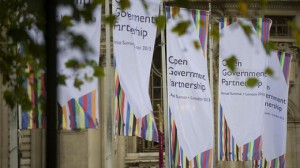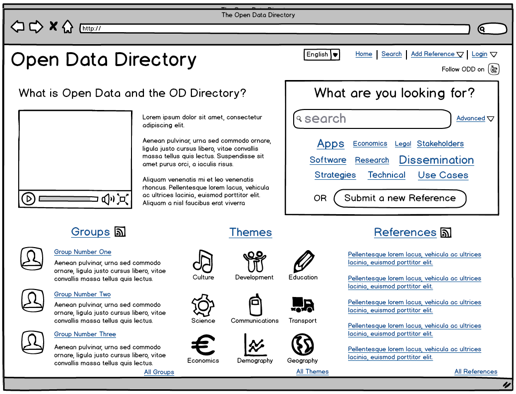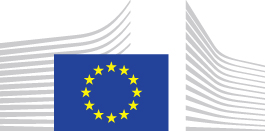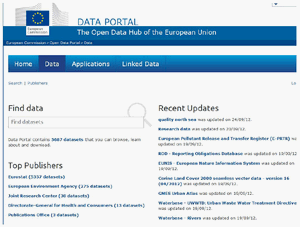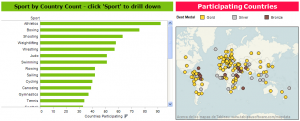Open Data enables Transparency and Accountability and this is why it is an important component of every Open Government. As a sign of the aforementioned, if we do a review on each of the country commitments at the Open Government Partnership we discover that 28 of the total 55 country members have explicitly included Open Data as part of them.
Open Data Government Commitments
Here we have an overview of what each country commitments include according to the OGP website as per today:
Albania
The National Agency for Information Society is establishing a governmental portal in the open data format. This portal will initially include data for daily expenses by all central institutions and agencies and the National Postal and Electronic Communications Authority database.
The National Statistics Institute (INSTAT) will also implement on its long term strategy the Open Data format for its database and standardize the entire process of publishing the public sector’s statistical data.
Brazil
Catalogue of Public Data and Information provided on the Internet by agencies and entities of the Federal Public Administration. The catalogue will identify and compile in one document all public information available on selected agencies.
In adittion, a new Government partnership with W3C Brazil was born to stimulate and build capacity of the national and sub national governments to publish Open Data.
Bulgaria
Bulgaria’s strategy is currently focused on several actions related to economical data:
- The web site of the Council of Ministers provides public access to the database with all concession contracts granted in Bulgaria both at national and local levels.
- Enhance the public use of the information system for management and monitoring of the Structural Funds and the Cohesion Funds.
- Publish data on Government spending on a daily basis.
Canada
Their Open Government Strategy has three main streams: Open Information, Open Data, and Open Dialogue.
The country has launched an Open Data Portal pilot project in 2011 which now has more than 272,000 datasets from 20 departments and which has already resulted in over 100,000 dataset downloads since its launch.
Their future commitments include:
Chile
They will develop an Open Government Portal by the end of 2012 that will centralize several initiatives – Transparency, Participation and Public Data – on a unified platform to facilitate their understanding and use by citizens.
Public Servants will also be instructed on Open Government standards and how to promote data availability.
Colombia
The Open Data portal is a pilot project in which four Government agencies participate providing unified and open access to all data published by them for access by citizens, educational institutions and businesses.
The final objective is to work on Guidelines so that all Government agencies will publish and disseminate data on their various individual web pages. The Open Data site will become a mechanism for coordination and instruction on the access and use of data.
Croatia
The accessibility of local budget contents will be increased by giving recommendations and instructions to local and regional self-government units on publishing key budgetary documents on their websites and publishing guidebooks for citizens.
Access to information on expending public resources and contents of relevant registers will be improved in the field of political activity and electoral campaign financing, public procurement, television and media services, state property management, payments executed through Treasury Single Account, NGO financial statements and timely publishing of regional and local representative bodies’ sessions’ agendas and materials.
Denmark
Open public data is an important digital resource which can be used in the development of commercial products, to create better and smarter public sector information and services, to disseminate knowledge and insight, and to enhance transparency and democracy. This is why Denmark has renewed their efforts to Open Government Data.
It is also important to rethink the way key data is distributed across the public sector in order to ensure that data can be accessed in one place and is easily and consistently available for re-use by all public authorities.
Estonia
Make maximum use of Open Data opportunities is one of the main challenges for the country along with public services integration and providing new communication channels.
The development of public services to grant access to public sector data in a form that can be machine-readable is one of the main goals of the Action Plan.
Greece
Open government data is a tremendous resource that is as yet untapped and the Government is committed to open up this data.
Informal partnerships will be fostered among the actual stakeholders of Open Data with the purpose to provide applications and services that have measurable positive effects on people’s lives, inspire innovation and stimulate financial growth.
A couple of real examples are:
- Operating for less than 20 months, geodata.gov.gr has succeeded in providing savings of more than 20M Euros for the public administration (data re-use), and has aided hundreds of SMEs, engineers, and researchers in their work.
- The Open Taxation Data initiative aims to improve the accountability and have published extensive statistical data from the year 2000 onward. In addition, they has made available on a daily basis each regional tax office’s outstanding and has handled cross-checking cases.
Indonesia
The efforts towards poverty reduction and the prison system have been constantly receiving allegations for mis-targetting and data rigging. Two key Open Data actions were taken to improve transparency:
- Bringing more transparency and accountability to poverty reduction interventions was aimed to ensure that beneficiaries receive what they are entitled to by involving public participation in the process.
- An initiative has been launched to make prisons information widely available to public. Such information will help the public to scrutinize prison system’s conducts by comparing data provided by other institutions.
Israel
The Government of Israel is committed to freedom of information, and to promoting transparency and accessibility to data and information produced in the public sector.
Since December 2011, they worked in cooperation with the Partnership’s Networking Mechanism to obtain comments from international organizations, as well as experts from the academic world, Open Data entrepreneurs and the Government of Croatia.
Italy
The first national Open Government Strategy was centred on three main axes:
- Open Data and applications.
- Public Administration 2.0.
- Government Cloud.
Government launched the National Open Data Portal, which publishes the dataset catalogue and the smartphone app catalogue. The opening up of data is also being supported through several other initiatives:
- The open data guidelines, which provide guidance on legislative issues, how to open a dataset, technical aspects and useful descriptions of the national catalogue.
- Weekly online seminars (webinars) to introduce, analyse and present relevant experiences.
- Definition of and support for the adoption of the Italian Open Data License (IODL).
- Apps4Italy, a challenge to promote Open Data reuse through applications and creative data processing.
Their future commitments include a strategy for Open Data enhancement and a new Transparency Portal.
Kenya
Kenya was the first country in sub-Saharan Africa to have an Open Data portal. This initiative, supported by the World Bank and other partners, makes key government data freely available to the public through a single endpoint.
Latvia
Freedom of information has been ensured to provide access to information from Public Administration and initial prerequisites have been created for data re-use in the meaning of the open data system.
México
Through the interoperable open data mechanism, the Government will strive to promote the integration of processes related to digital services and the use of common platforms and information systems in order to foster the use of raw databases by citizen.
Moldova
Open Data is one of the key pillars of the Governance e-Transformation agenda. The Open Government Data portal was launched in April 2011, and the Open Data Initiative was shortly institutionalized through the Prime Minister’s Directive. In February 2012, according to Prime Minister’s Indication, every central public institution assigned a person responsible for Open Data that form the Open Government Data Working Group.
Their commitments include the development of the Open Data portal into a single point to all government data and ensuring the re-use of public sector information.
Montenegro
The Ministry of Finance posts monthly and quarterly analytical data on generated revenues, expenditures, public debt and deposits on its website. All draft laws and strategies are also posted on the website.
Ministry of Finance publishes monthly Macroeconomic Review, a publication that keeps track of the trends of macroeconomic and fiscal indicators on monthly level. The idea originated from the need of users of data and analyses for brief and comprehensive reviews. Budget transparency remains a challenge for some spending units.
Netherlands
Their focus is on improving public service provision, strengthening citizenship, and using the opportunities that Open Data offers for service provision and economic growth and, at the same time, paying attention to the issue of transparency.
Their commitments include a programme to enhance accessibility and facilitating reuse of government information carrying out different actions like:
- Maintenance and ongoing development of the Open Data portal.
- Eliminating legal, technical and organisational obstacles for the reuse of Government information.
- Establishing an Open Data knowledge network to develop best practices.
Philippines
Within the next year period the Government will craft a roadmap for the development of a Single Portal for Government Information, which complies with basic Open Data standards.
República Dominicana
Will make an inventory of governance indicators, which will be open to the public, and a query tool for them. The commitment links with the Action Plan in its compromise to increase the information on governmental activities and its contribution to citizen’s participation.
By the end of the project, the future Government website www.data.gov.do will be the most important source of public statistics and data.
Romania
The National Action Plan tackles the Open Government concept from the perspective of two pillars: public access to Open Data and the offering of public eGovernment services.
The country is committed to facilitate public access to open data through several actions that include: public CIOs, regulatory needs, inventory of datasets, pilot projects, uniform publishing formats, stimulate the markets, consult public information needs and monitor the initiative.
Slovack Republic
Their Open Data Portal is not only a standard website providing various data. It is a catalogue of available public administration data that will be accessible and provided in a standardized form to enabled further computer processing, either automated or through development of applications to be used directly by citizens.
Their commitments also include:
Spain
Has launched its Open Data website, singled out as the most user-friendly Open Data portal in the European Union, a prize awarded by LAPSI.
The goal is to stimulate access to the information in the hands of our public administrations and its re-use, in the conviction that these public data represent economic and social assets that should be made available to the private sector.
Sweden
They have currently ongoing work to define the next generation strategy for Open Data and public services in which Government innovation will be driven by external partners in combination with Open Data.
Full implementation of the IATI standard and engaging in the Open Aid Partnership are also included as specific commitments.
United KingdoM
One of the key reference initiatives in the Open Data World and also co-chair of the Open Government Partnership from next year.
The UK has one of the most ambitious Open Data Agendas and is committed not only to make data open, but to establish mechanisms to promote and collate feedback from those actually using the data.
Some of their key commitments include:
Uruguay
The site datos.gub.uy is a space that contains all data made public by every Government agency, making them accessible to everyone.
The goal is to have established an official data catalogue by November of 2012, along an Open Data community and manuals addressed to the different stakeholders: Civil Society Developers and the Citizenship in general.
United States
Other of the key reference initiatives worldwide has issued a memorandum requiring Federal enforcement agencies to make publicly-available compliance information easily accessible, downloadable, and searchable online.
As agencies developed their Open Government Plans, they made unprecedented amounts of information available and easily accessible to the public, in part through a centralized government platform. This platform, designed in large part to provide people with information that they can readily find and use, now gives the public access to over 390,000 high value agency data sets on such diverse subjects as auto safety, air travel, air quality, workplace safety, drug safety, nutrition, crime, obesity, employment, and health care.
Too few or a lot?
Given the results we can conclude that Open Data is without doubt an important topic in relation to Open Government but, how important?
Having 28 countries with Open Data commitments of the total of 55 could looks like a low percentage (about a 50%), but we may also have into consideration that 20 of the 55 country members are still working on their commitments and have not yet submitted them, so that leave us with a total of 28 countries that bet on Open Data among the total of 35 that have already submitted their commitments. That’s now an 80% that support Open Data, a number that indicates how important Open Data is becoming in the Open Government global agenda.
Let’s hope that the remaining countries will also incorporate Open Data to their respective Agendas soon.
